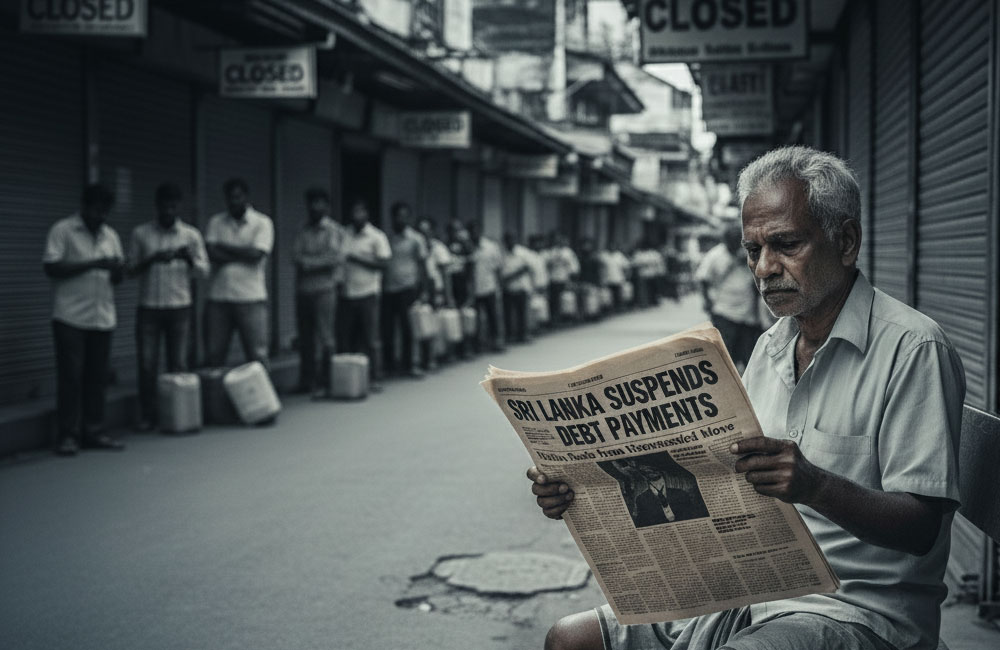A Decision That Shook the Nation
Former Finance Minister Ravi Karunanayake has reopened one of the most controversial chapters in Sri Lanka’s modern economic history the Central Bank’s 2022 decision to suspend external debt repayments without parliamentary approval. His questions have reignited debate over whether the move, announced by Central Bank Governor Dr. Nandalal Weerasinghe, was a technical necessity or a constitutionally flawed act that deepened the island’s financial collapse.
Unanswered Questions over Authority
In a letter to President Anura Kumara Dissanayake, Karunanayake demanded clarity on who authorised the unprecedented declaration of a “temporary suspension” of debt payments on April 12, 2022 just days after Dr. Weerasinghe assumed duties as Governor. The former minister alleged that no parliamentary or Cabinet approval had been sought, and no legal framework existed for the Central Bank or the Ministry of Finance to unilaterally halt debt servicing.
An Unprecedented Move without Approval
Media archives confirm that Weerasinghe, addressing reporters in Colombo on April 12, 2022, stated that “it has come to a point that making debt payments are challenging and impossible,” framing the move as an “interim measure” until an agreement was reached with the IMF and creditors.
The decision was portrayed as a prudent step to preserve dwindling foreign reserves for essential imports such as fuel, medicine and food. Yet, no official record has emerged showing that the Cabinet, Monetary Board, or Attorney General had endorsed this course of action prior to the announcement.
Bleak Economic Realities behind the Default
The numbers at the time painted a desperate picture. By end-March 2022, official foreign reserves stood at around US$1.9 billion, while external debt obligations due that year exceeded US$6 billion. Treasury data later revealed that usable reserves had fallen “to near-zero levels” by April 2022.
The World Bank reported that by mid-year, reserves excluding a US$1.5 billion swap line with China had dropped below US$400 million. Against this backdrop, the government’s capacity to maintain debt payments while importing essentials had effectively vanished.
Default Inevitable, But Was It Lawful?
Economists now concede that Sri Lanka’s default was, in practical terms, unavoidable. But the legality and process remain deeply contested. Karunanayake argues that the issue was not inevitability, but legitimacy whether the decision was taken with proper legal and parliamentary oversight.
“This was not merely a technical decision,” he said. “It was an executive act that redefined our economic destiny without the people’s representatives being consulted.”
Economic Meltdown and Social Fallout
The aftermath was swift and severe. Sri Lanka’s credit ratings plunged to junk status, international lenders withdrew, and the rupee collapsed by nearly 80 percent in the following months. Inflation soared beyond 60 percent, pushing millions into poverty and forcing the government to seek IMF assistance under a US$3 billion Extended Fund Facility in 2023.
The default effectively sealed Sri Lanka’s exclusion from global capital markets and triggered a prolonged economic contraction that continues to burden the nation.
Governance Failure and Constitutional Concerns
Investigations reveal that while the financial collapse made a suspension almost inevitable, the lack of procedural legitimacy has left a deep scar on Sri Lanka’s governance. There was no Cabinet paper, no Attorney General’s opinion, and no parliamentary resolution authorising the default — only a press conference that altered the country’s economic trajectory.
A Call for Accountability Three Years On
Three years later, as the nation struggles to rebuild credibility and investor confidence, Karunanayake’s call for accountability exposes a deeper institutional failure. The 2022 default may have been a financial necessity, but without transparency and parliamentary consent, it became a constitutional aberration.
The question that still echoes through Colombo’s corridors of power is not just who announced the default but who authorised it.

Leave your comments
Login to post a comment
Post comment as a guest